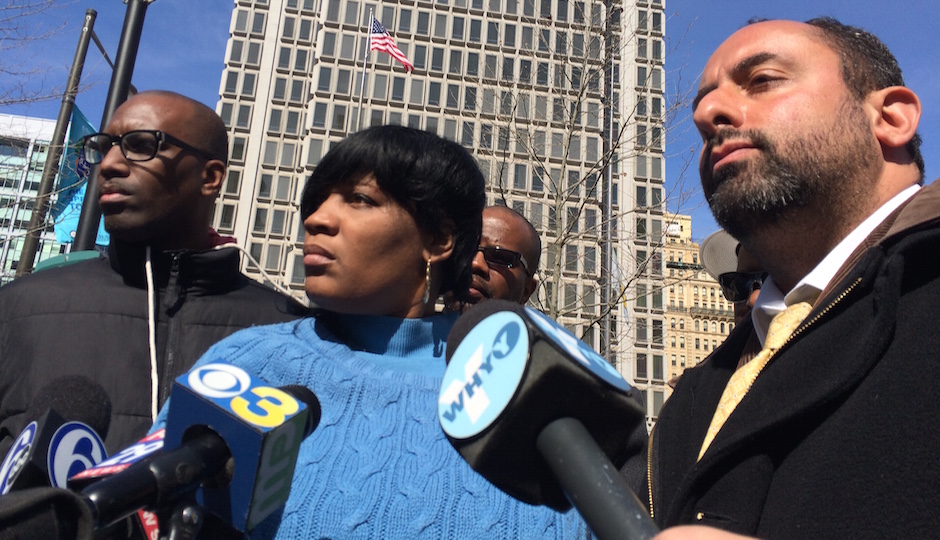Brandon Tate-Brown Was Killed a Year Ago Today

Tanya Brown-Dickerson, center, is flanked by Asa Khalif, left, and Brian Mildenberg, right, during a press conference in March. Dickerson’s son, Brandon Tate-Brown, was shot to death by police in December.
Today marks one year since Philadelphia Police shot Brandon Tate-Brown, fueling the city’s #BlackLivesMatter movement. The anniversary will be remembered with an afternoon rally at City Hall — but the fight over the shooting and its meaning could continue for years to come.
https://twitter.com/brownblaze/status/676752457138049024
Tate-Brown was 26 when he died during a traffic stop with police. Officers said there was a gun in his rented car — initially they said he was reaching for it when he was shot, later they revised the story to say he was running around the back side of the car. His family has brought a federal lawsuit against the police department, alleging that Tate-Brown’s constitutional rights were violated in the shooting.
That lawsuit, still in its early stages, may take a while to resolve. But here’s three ways his death made life different in Philly during the last year:
Commissioner Ramsey found it difficult to speak in public during his last year on the job. After D.A. Seth Williams said he wouldn’t bring charges against the officers involved in the shooting, Ramsey’s public appearances immediately became more fraught — protesters often turned up to try to drown him out and keep him from speaking. The first time, at Lawncrest Recreation Center, the protest turned into a minor clash between police and protesters.
https://twitter.com/joelmmathis/status/578695863113019395?ref_src=twsrc%5Etfw
That was far from the only time: Protesters also crashed Ramsey’s October talk at the National Constitution Center. By that time, though, he’d gotten used to it. “I told you,” Ramsey said to moderator Jeffrey Rosen as soon as the chants began.
It started a debate over whether police involved in such shootings should be publicly identified. For #BlackLivesMatter activists, the answer to the question was a no-brainer: Of course such officers should be identified; it was one of their demands in the early months of protests. (The officers involved, Nicholas Carrelli and Heng Dang, were identified in June.) Ramsey ultimately agreed — announcing in July that officers in shooting encounters would be identified within 72 hours.
But there was opposition: The Fraternal Order of Police said Ramsey’s order put officers at risk — and the Pennsylvania Legislature got to work on a bill that would largely block those names from public view. Ramsey announced his opposition to that bill, and there’s no telling whether it will progress beyond the committee level in Harrisburg.
It added fresh impetus to the city’s police reform process. That process was coming to Philly anyway — Ramsey had served as the leader of President Obama’s task force to make reform recommendations, and he’d also invited the Department of Justice to take a look at his department’s own use-of-force policies before the Tate-Brown incident.
Before Tate-Brown’s death, those efforts seemed to some extent like abstractions: The DOJ investigation was based on the department’s rising use-of-force numbers in an era of lowering crime, for example, and not over any particular incident. After Tate-Brown’s death, though, activists could increasingly be found at public events that touched on the reform process, giving the issue fresh urgency.
The city, it should be noted, continues to deny wrongdoing in the case; Williams has never agreed to reconsider the possibility of charges against the officers involved.. The city in November asked that the federal lawsuit brought by Tate-Brown’s family be dismissed — and cited the progress of police reform efforts in support of its motion. Even if the lawsuit is dismissed, though, Tate-Brown’s death will have already left its mark on the city.
Follow @JoelMMathis on Twitter.


